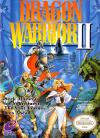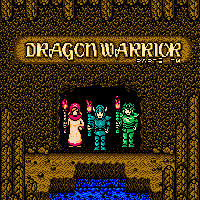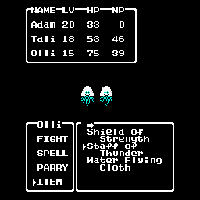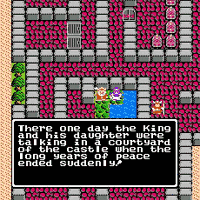It is golden week in Japan and I have taken the time to defeat the second Dragon Quest game in the series. I plan to take a break and move on to another game within the same era (the mid-1980s). If anyone can provide a suggestion, I am all ears. Anyway, this game is the second Japanese video game I have played; the other being the first Dragon Quest game. One of my first reactions to the game was of interest because it is a direct sequel to the previous game that I played and shares many similarities. That being said, the game greatly expands, in many ways, the systems and narrative that were established in the first Dragon Quest. The story, music, and themes are all improved while the mechanics broadened but maintained their simplicity. Altogether, I enjoyed my far longer experience with the second game in the Dragon Quest series.
The story of Dragon Quest II is about the scions of the previous protagonist in Dragon Quest. The descendant of Loto (aka Dragon Quest I hero) establishes three kingdoms over the course of his reign but after one hundred years, a power hungry sorcerer named Hargon decides to attack one of those kingdoms without provocation. This sets off a series of events in which the Prince of Lorasia, the Prince of Cannock, and the Princess of Moonbrook join forces to thwart the menace to their kingdoms and, ultimately, the world. Along the way, the three of them seek out knowledge, wisdom, and the means to find and defeat the evil sorcerer. The story itself follows the same narrative structure of its predecessor but executes it in a more systematic way. The first part of the story focuses on gathering allies and rescuing princesses. Unlike Dragon Quest I, there are more characters who support you on your quest which includes a princess that you get to save. The second part focuses on providing help to others and securing the treasures and secrets necessary to confront Hargon. Like in Dragon Quest I, you need to gather information from different people in order to find the necessary tools to defeat your enemies. In addition, there are local troubles and difficult segments that test your ability to discern what your next step is. This adds an element of mystery to the game. The last part is the home stretch of infiltrating the evil realm and defeating Hargon himself, only to be confronted by a more sinister being afterwards. Fortunately, it was not a Deus ex machine since the overall plot has given plenty of hints in the form of items and rumors pointing to the evil demon at work behind the sorcerer. After having saved the world, you are able to return home, along with your cousins, to a land of peace and prosperity. However, one of the most interesting aspects of this game is the moral of the story. Instead of only providing the meaning at the end of the story, it is littered throughout the narrative: Never trust something at face value. Deception is prevalent through the story in both ways. For example, an interesting old man helps you find the moon shard only to back stab you at the very end in an ambush (or at least tried). Contrasting that, the descendant of Dracolord from the first Dragon Quest was actually quite helpful to you despite the misgivings you have about his word. Navigating through the trial and deception of the story was the meaning behind the game and I find it quite telling of its depth. The story is certainly within the form that Dragon Quest has established but what about the music?
Fortunately, the musical composer was the same (and so was the original designer for that matter) and the music retained the pomp and epic feel that its predecessor had. I was glad to hear that they kept the overture as it was one of my favorite pieces. At one point in the story, the three scions visit the kingdom of Alefgard and I was happy to experience all the original musical themes for that region of the world. Dragon Quest II expanded on its musical themes well while retaining the atmosphere and ambiance that established its character in the first game.
After having played the first game, there seems to be a prevalent theme that has been working behind the scenes in both Dragon Quest I and Dragon Quest II: belief. Keep in mind that there is no such understanding of religion in Japanese culture as there is in western civilization. Shintoism, Buddhism, and Confucianism are ways of life rather than philosophies or religious institutions. Just as in Japanese culture, the way of life in Dragon Quest is established but not necessarily institutionalized as a religion. Certainly, the wise men provide services to you throughout your journey but they do not evangelize or separate themselves from secular matters. One priest in particular explained that some people are losing their understanding of belief as a result of Hargon the Sorcerer. When you talk to those people (usually the ones in jail), their cynicism and practicality convey loss in ideals rather than a crime. Overall, I am quite interested to see how Dragon Quest and other Japanese video games incorporate the themes of belief and how they differ from the normal fantasy concept of religion (usually Christian in nature).
The mechanics of the game remain ultimately the same but they have been broadened. The player controls a set of three characters instead of only one like in Dragon Quest I. The amount of equipment, spells, items, characters and enemies are increased and expanded. The world map is larger and more intuitive. Yet, despite all the additions, the game remains simple and quite difficult. You still need to fight off hoards of enemies as they try and stop you from reaching your objective. You still need to secure access to equipment and magical items to provide passage to Rhone to defeat Hargon. You still need to gather information and explore in order to progress through the game. All of these simple concepts are retained and allow me to enjoy the new features of the game without worrying about the older features.
In the end, I enjoyed the story and found the background established to be quite intriguing. The story was a direct sequel to the previous game but it expanded greatly upon the narrative and setting. The music of the game was retained and new thematically appropriate pieces were added as well. The theme of belief seems to be prevalent throughout the first two games and I will be watching for how it grows throughout the series as a whole in contrast to western fantasy religious themes. Everything has been expanded and broadened but the game itself remains simple and approachable to even a person like myself who has barely played any video games to their completion (this one is my second completed game after Dragon Quest I).
Next, I will try my hand with the first Final Fantasy game and the Legend of Zelda which were released around the same time. Feel free to provide any other suggestions of games with a story from the mid-1980s. |
 Bizzgeburt is Offline
| ID: 590184 | 113 Words
Bizzgeburt is Offline
| ID: 590184 | 113 Words
 Bizzgeburt is Offline
Bizzgeburt is Offline


 User Notice
User Notice 








